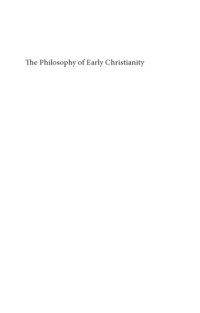
Ebook: The Philosophy of Early Christianity
Author: George Karamanolis
- Year: 2013
- Publisher: Acumen Publishing
- Language: English
- pdf
What is the philosophy of early Christianity?
Th ose of us brought up in the West have a general conception of what
Christianity is. We are much less familiar, however, with the philosophy
of Christianity, let alone the philosophy of early Christianity.
Some readers may fi nd these phrases puzzling for a number of reasons.
One reason for puzzlement may have to do with the phrase
“early Christianity”, which is admittedly vague. Both the apostle
Paul, who writes his letters between 40 and 60 ce, and Augustine
(354–430), who writes many of his works in the early fi ft h century,
are considered early Christians in the literature.1 I leave both
of them out of this book, however. I mean to neither discuss the
philosophical ideas of Paul, nor go as far as the early fi ft h century
and examine Augustine. Rather, I aim to focus on thinkers who live
between the second and fourth century, like Justin Martyr, Clement
of Alexandria, Irenaeus, Tertullian, Origen, Basil of Caesarea and
Gregory of Nyssa, to name the most prominent ones. My focus,
more specifi cally, will be on the period until the Council of Nicaea
(325) and I shall be selective with fi gures from the fourth century,
for reasons I explain below.
Th ose of us brought up in the West have a general conception of what
Christianity is. We are much less familiar, however, with the philosophy
of Christianity, let alone the philosophy of early Christianity.
Some readers may fi nd these phrases puzzling for a number of reasons.
One reason for puzzlement may have to do with the phrase
“early Christianity”, which is admittedly vague. Both the apostle
Paul, who writes his letters between 40 and 60 ce, and Augustine
(354–430), who writes many of his works in the early fi ft h century,
are considered early Christians in the literature.1 I leave both
of them out of this book, however. I mean to neither discuss the
philosophical ideas of Paul, nor go as far as the early fi ft h century
and examine Augustine. Rather, I aim to focus on thinkers who live
between the second and fourth century, like Justin Martyr, Clement
of Alexandria, Irenaeus, Tertullian, Origen, Basil of Caesarea and
Gregory of Nyssa, to name the most prominent ones. My focus,
more specifi cally, will be on the period until the Council of Nicaea
(325) and I shall be selective with fi gures from the fourth century,
for reasons I explain below.
Download the book The Philosophy of Early Christianity for free or read online
Continue reading on any device:

Last viewed books
Related books
{related-news}
Comments (0)